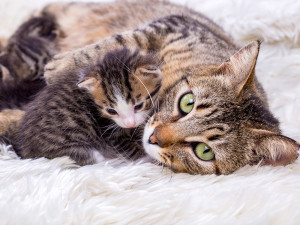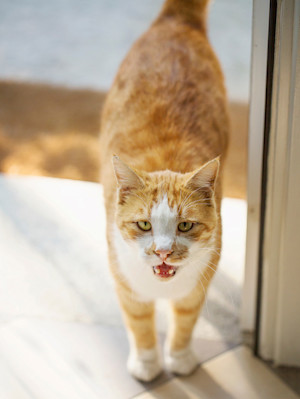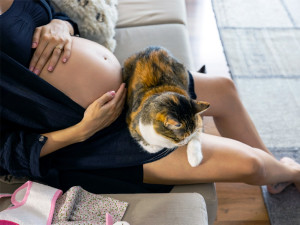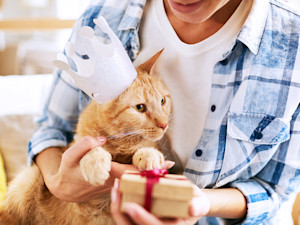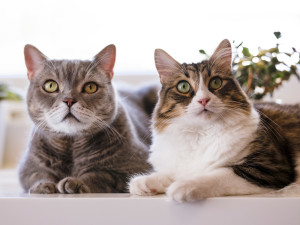How Long Are Cats Pregnant? 10 Interesting Feline Pregnancy Facts

Share Article
In This Article:
Everything blooms in spring, including kittens. Cats have a relatively short pregnancy of about two to two and a half months, so by the time many pet parents realize their cat is pregnant, it’s time to start preparing for the arrival of baby kittens. If you live somewhere that experiences the four seasons, you’ll know that spring is a time when nature comes to life, with leaves budding, birds singing, and, of course, lots of baby animals.
Cats are also influenced by the seasons and typically go into heat when days start getting longer and there are more hours of sunlight. Cats are very efficient breeders, meaning that if a cat is not spayed and is around a male cat during her heat cycle, she is very likely to get pregnant. Read on to learn more fascinating trivia about pregnancy in cats.

10 interesting feline pregnancy facts
There are many idiosyncrasies of cat pregnancy that may come as a surprise to pet parents. While not every cat will experience pregnancy the same way, there are some broad generalizations that tend to apply. If you are unsure if your cat is actually pregnant or you are concerned about her behavior or physical health, always check with a veterinarian to be sure there are no other medical problems or complications arising. Here are some of the most interesting facts about pregnancy in cats:
1. Strange early signs a cat is pregnant
In the earliest stages of pregnancy, many female cats, or queens, won’t show any signs at all. Then, they may start to become more clingy, vocal, or seek out affection. At first, they may experience a decrease in their appetite as well, but over the course of pregnancy, their appetite will usually increase.
2. How long are cats pregnant?
The average length of pregnancy in queens is 65 days, but this may be up to seven days shorter or longer for some cats. It is often difficult to pinpoint the exact day that a cat became pregnant since many pregnancies happen without us knowing. Therefore, most of the time, estimates are used to determine approximately how far along a queen is and when she may be likely to give birth.
3. Weird pregnant cat behavior to watch for
Pregnant cats often show unusual behaviors as they prepare for the birth of their kittens. Often, this involves nesting behaviors aimed at setting up a safe space for their kittens. They may select a quiet, hidden space and start to carry in soft materials like fabric and bedding. They may also become more affectionate, vocal, restless, and hungry as their pregnancy continues. You can help your cat by setting up a nest box with soft blankets in a secluded, quiet, space away from other animals and people.
4. When can cats get pregnant?
Most cats reach puberty and sexual maturity by around six months old. For some large-breed cats this may happen a little bit later and for some cats, it can occur as early as four months old. In order to be safe and avoid unwanted litters, it is safest to assume that cats may be able to get pregnant by four months old.
5. How many kittens will a first-time pregnant cat have?
The average litter size for domestic cats is four kittens but cats can have anywhere from one to eight kittens or even more. Usually first-time cat moms tend to have smaller litters but this is not always the case.
6. Does the number of nipples determine the number of kittens?
No. The number of kittens that a cat has is based on how many eggs were fertilized during mating. Cats are induced ovulators, which means that if they mate multiple times during a heat cycle, additional eggs may be released and can be fertilized.
7. Do cats have all their kittens at once?
Usually once a cat goes into labor, the kittens are born one at a time at a consistent rate with one kitten delivered every 60 minutes or less. If a cat becomes extremely stressed during labor, it is possible that her labor will pause and she may deliver additional kittens many hours later. Any cat that is actively pushing for more than an hour without delivering a kitten should see a vet as this can be a sign of a pregnancy complication.
8. Pregnant cats need more calories and protein — here’s why
Pregnant cats have a higher metabolism and increased demand for specific nutrients. For this reason, they need to eat a diet with additional calories that is more nutrient-dense. Kitten food is a good option for pregnant and nursing cats, as are diets specifically labeled for pregnancy and lactation.
9. What to avoid when your cat is pregnant
While your cat is pregnant, it is best to minimize stress and any major changes in her routine. Do not introduce other animals, especially stray animals that may bring infectious diseases into your home. While routine veterinary care is very important during pregnancy, be sure to notify your vet if you suspect your cat is pregnant as some treatments, medications, and procedures should be avoided during pregnancy.
10. How often should I feed a pregnant cat?
Offer a high-quality, high calorie diet that is intended for pregnant and lactating cats, or offer kitten food. Pregnant cats should be provided with additional food to ensure their nutritional and caloric needs are met. You can offer multiple feedings per day or leave additional kibble available at all times. Once your cat delivers her kittens, it is important to make sure to provide food and water in the nest box so she can eat while caring for her newborn kittens.
The bottom line
Cat pregnancies are relatively short so by the time you notice your cat is pregnant, she may be close to delivering her kittens.
Be sure to prepare a safe, quiet nesting area and appropriate diet for your pregnant queen.
Because cats can get easily get pregnant by the time they are 4 to 6 months old, it is strongly recommended to spay and neuter your cats before they reach sexual maturity
References
Davidson, A. “Breeding management of dogs and catsopens in new tab.” Merck Veterinary Manual, September 2024.
Holst, B. “Feline breeding and pregnancy management: What is normal and when to interveneopens in new tab.” Journal of Feline Medicine and Surgery, 2022, vol. 24, no. 3, pp. 221-231.
Kustritz, M. “Clinical management of pregnancy in catsopens in new tab.” Theriogenology, 18 April 2006, vol. 66, no. 1, pp. 145-150.

Dr. Amy Fox, DVM
Amy Fox, DVM is a small animal veterinarian in New York City with over thirteen years of experience in a mixture of general practice, emergency medicine, and shelter medicine. A lifelong animal lover, Dr. Fox studied biology in college and then worked as a veterinary nurse before pursuing veterinary school at Cornell University. Her expertise includes surgery, dentistry, and management of chronic conditions, and she is interested in toxicology, pain management, nutrition, care of senior pets, and educational outreach. Dr. Fox also enjoys writing about veterinary medicine and teaching, and her work has previously appeared in Spruce Pets. In her free time, she loves to cook, garden, go for long runs, and hang out with her goofy mixed-breed dog May, who provides never ending comic relief!
Related articles
Can Cats Sense Pregnancy?
Yes, cats can detect pregnancy in humans.
![Woman giving Birthday present to ginger cat wearing crown.]()
Cat-Age Chart: Calculating Your Cat’s Age in Human Years
Know what to look for at every stage.
When Can Your Kitten Be Spayed?
Learn why vets recommend spaying as early as possible.
![Male and female cat lying side by side.]()
How to Spot the Difference Between Male and Female Cats
There’s more to it than what you learned in health class.
Why Is My Cat Suddenly Clingy?
They’re never far away, but you’d like a little distance.
How Young Can a Kitten Get Pregnant?
And at what age is it safe?
